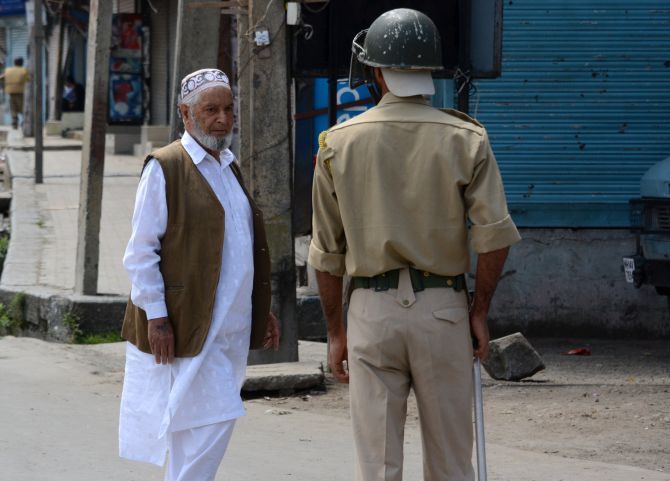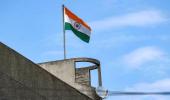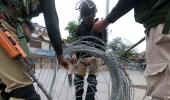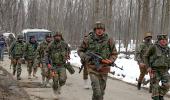'Pakistan will leave no stone unturned to keep Kashmir on the edge and put the entire blame on the Government of India if there is any untoward incident,' says Brigadier Narender Kumar (retd).

Pakistan got very little international traction on Kashmir in spite of its global rant and hubris.
The call for Kashmir hour was deflated by lack of public support within Pakistan. As a result, within 24 hours of the failure of the Pakistan government to drum up public support, Foreign Minister Shah Mohammad Qureshi made a conditional offer for talks with India.
The Deep State of Pakistan is convinced that this is the time to seize the initiative from India on Kashmir, therefore, it will employ conventional and unconventional means to create a situation of no return in Kashmir.
Pakistan is aware that if they fail now, their dream of 'Kashmir Banega Pakistan' will remain unfulfilled. Pakistan is trying its best to internationalise the Kashmir issue, but the international community has conveyed to Pakistan that do what they wish, but do not use terrorism as a tool to exploit the current turbulence in Kashmir.
The risk of the Financial Action Task Force (FATF) is still hanging over Pakistan and therefore, it will try and create conditions in Kashmir to suggest that the Government of India is at war with the people of Kashmir.
The picture being painted by Pakistan is that the Government of India has unleashed repressive policies against the people of Kashmir post the reorganisation of the state.
Separatists and terror groups working on a strategy worked out by the ISI are forcing an artificial lockdown that is not being somehow highlighted by the media.
Shops are being forced shut, young children are being forced to stay away from schools and colleges, transport operators are threatened with dire consequences if they operate their vehicles against the diktat of terrorists and separatists.
Even apple growers are being told not to send apples to Delhi and other markets out of J&K. An intense poster campaign to threaten violators of the diktat by the proxies of Pakistan is taking place.
A truck driver was killed by stone pelters and a shopkeeper was shot dead for violating the diktat of the terror groups in Kashmir.
The ISI and proxies of Pakistan are creating conditions on the ground where the government is forced to lay restrictions to prevent collateral damage and loss of precious lives.
The question is why is Pakistan resorting to such tactics?
Pakistan was taken by surprise when the Government of India revoked Article 35A, amended Article 370 and reorganised the state into two Union Territories.
After absorbing the shock of this new development, Pakistan considered it as an opportunity to snatch the initiative from India and internationalise Kashmir issue globally.
Pakistan has been employing every possible trick in its kitty to muster international support on Kashmir. This is also an opportunity for the Pakistan government to deflect internal instability by ratcheting up the Kashmir issue.
How long will Pakistan ensure the 'artificial lockdown in Kashmir' by coercive strategy? Pakistan is aware that the entire September month is key to gaining international traction on Kashmir.
It could not have come at such an opportune time. There are two major events in September: The 42nd session of the human rights council will take place between September 9 and 27 in Geneva.
Pakistan is already preparing to launch a frontal attack on India on the issue of human rights in Kashmir.
The second event is the 74th session of the UN general assembly commencing on September 17, 2019. The prime minister of Pakistan is likely to address the UNGA on September 27 where he will certainly raise the Kashmir issue.
Therefore, Pakistan is looking at creating opportunities to heighten the instability in Kashmir so that government forces are compelled to use force against rogue elements.
Pakistan will leave no stone unturned to keep Kashmir on the edge and put the entire blame on the Government of India if there is any untoward incident.
The ISI will do their best to create as many body bags as possible and blame the Government of India for the bloodshed.
Therefore, the Centre and state governments must expose Pakistan's design and let the world know that the real elephant in the room is Pakistan that is not letting normalcy set in.
To counter Pakistan's strategy of forcing the artificial lockdown, India must let the world know through daily briefings where restrictions on mobility and communication have been lifted.
How many schools and educational institutes have been opened?
The security forces must be sensitised to be patient and take rationale actions to maintain peace. Daily interaction with the locals by government functionaries and central leadership must be organised to defuse confrontation, if any.
The media must be advised to avoid demonisation of politicians in Kashmir. All those who are detained under the Public Safety Act must be treated with dignity and a phased release before the UNGA must commence.
To have the ears to the ground, the ministry of external affairs could have one of the MEA officials or an army officer currently on deputation with the MEA deployed in Kashmir to give a firsthand account so that External Affairs Minister Dr Subrahmanyam Jaishankar and his team are updated on a daily basis to respond to the Pakistani diplomatic aggression.











 © 2025
© 2025